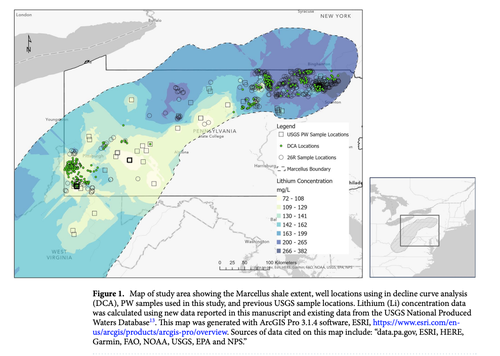Trump’s ‘Coal Country’ Could Supply Nation With 40% Of Lithium Demand
America’s transition to a decarbonized economy demands massive base metals and rare Earth minerals. Currently, China dominates the rare Earth mineral market. However, initiatives are already underway by the US federal government to sever reliance on the Chicoms and boost domestic mining and refining abilities.
One unlikely area where 40% of the nation’s lithium supply could be sourced from is ‘Trump’s coal country,’ otherwise known as good ole’ Appalachia.
According to Justin Mackey, a research scientist at the National Energy Technology Laboratory and PhD student at the University of Pittsburgh, wastewater from oil/gas rigs across the Marcellus Shale formation could supply the nation with 40% of its lithium needs.
“This is lithium concentrations that already exist at the surface in some capacity in Pennsylvania, and we found that there was sufficient lithium in the waters to supply somewhere between 30 and 40 percent of the current US national demand,” Mackey told CBS News.
Mackey said there are lithium mining operations in the US. But he told local media outlet Pittwire, “This is different. This is a waste stream, and we’re looking at a beneficial use of that waste.”
He said finding lithium in water recycled in hydraulic fracking wasn’t difficult, adding, “If you can extract value out of materials, and specifically lithium from this, then you reduce the cost of remediating and handling this waste.”
The researcher said future wastewater extractions of lithium from oil/gas rigs in neighboring states, such as West Virginia, Western Maryland, and Ohio, could spark an “economic boom for the region.”
Trump country has been economically decimated over the last several decades amid de-industrial trends. Death and despair, along with big pharma, helped ignite an opioid and pill epidemic that has killed tens of thousands, if not more.
Could Trump’s coal country be primed for revitalization trends and capitalize off decarbonizing trends? If so, then the land across the region could become increasingly more valuable over the coming decade.
Tyler Durden
Sat, 06/01/2024 – 19:15




Share This Article
Choose Your Platform: Facebook Twitter Linkedin